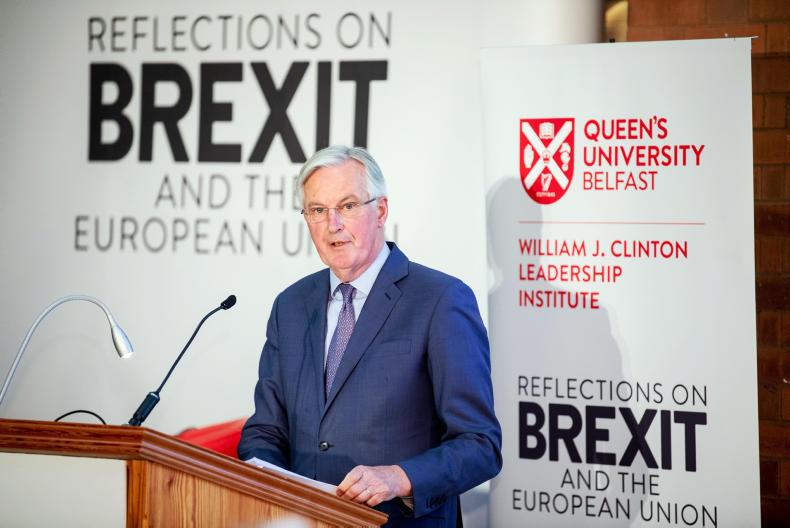Michel Barnier, who will lead the EU in negotiations with the UK on a future trading relationship post-Brexit, was in Belfast this week. He delivered the William J Clinton lecture on his reflections about Brexit at Queen’s University before an audience of industry leaders, academics and political representatives.
Future EU-UK trade
There was little consolation for anyone looking to a seamless future trading relationship with the EU. In a wide-ranging speech, he committed to “engage respectfully” with UK negotiators but said that there were consequences for the UK leaving the EU. He described any agreement on a future trading relationship as “damage limitation.”
In a reference to UK ambitions on being Global Britain, Barnier said that outside the EU, no member state including Germany would have the same impact, and none would be in the top 10 global economies in 2050.
He was also frank in saying that Brexit would mean creating trade barriers that weren’t currently in place and that the UK couldn’t leave the EU institutions and depart from regulations without experiencing negative side effects.
Northern Ireland was singled out as the part of the UK that would be most affected by Brexit.
He committed to “engage respectfully” with UK negotiators but said that there were consequences for the UK leaving the EU
Withdrawal agreement
Turning to the Irish protocol in the withdrawal agreement that is now signed off by both the UK and EU, he highlighted that the UK has agreed to “reinforced checks and controls for goods entering Northern Ireland from Great Britain.”
The UK was blamed for this by leaving the single market and customs union with the creation of two regulatory spaces making “frictionless trade impossible” and “checks indispensable”.
This is in contradiction of remarks made by UK prime minister Boris Johnson on trade between Britain and Northern Ireland. Barnier described the withdrawal agreement as a detailed legal text that had to be implemented precisely.
There is a joint EU-UK committee to implement the withdrawal agreement but this wouldn’t enable reopening the agreement under the guise of implementation, according to Barnier.
When questioned on the prime minister’s position in relation to trade between Britain and Northern Ireland, he was dismissive, referring to his speech and suggesting that the question be put to the prime minister.
The UK has agreed to “reinforced checks and controls for goods entering Northern Ireland from Great Britain”
Guest lectures in academic institutions are often philosophical in nature. However, on this occasion, the man that will lead the EU side in negotiations with the UK on a trading arrangement to take effect after the end of the transition period at the end of this year was extremely frank on what the EU position would be.
His recurring theme was that the single market was sacrosanct and that any agreement with the UK would act as a seamless alternative for trade. Trade with EU will not be frictionless and will involve checks.
Withdrawal agreement for farmers
Having checks and controls on the inward flow of goods has minimal effect on farmers either side of the Irish border.
They have implications for the food processing industries that source materials from Britain and will also have serious implications for Northern Irish factories that source cattle in Britain or transport beef carcases across for cutting and packing. The most immediate problems for farmers are averted with the withdrawal agreement, allowing milk and sheep to continue coming south for processing and pigs and cattle to go the other way.
However, both the Republic of Ireland and Northern Ireland are equally dependent on Britain as a market for agri-food exports with 90% of all production being exported, half of which is to Britain.
The most immediate problems for farmers are averted with the withdrawal agreement, allowing milk and sheep to continue coming south for processing and pigs and cattle to go the other way
There is no indication yet on the level of checks the UK will implement at border points with the EU but, if there are any, it will disrupt supply chains.
This is a particular concern for supermarket groups that receive daily deliveries from Britain and have finely tuned distribution arrangements based on timely arrival and passage through ports across Ireland.
The biggest concern of all for farmers is the UK approach regarding imports from other third countries.
The beef sector, in particular, is exposed if the UK decides on an open-door policy to all WTO countries as it will inevitably devalue the UK market for both Irish and British farmers. This is the biggest threat of all from the new post-EU era that the UK begins this Friday night.






 This is a subscriber-only article
This is a subscriber-only article










SHARING OPTIONS: